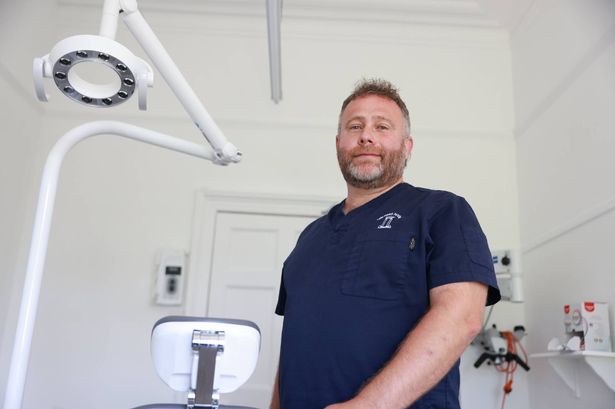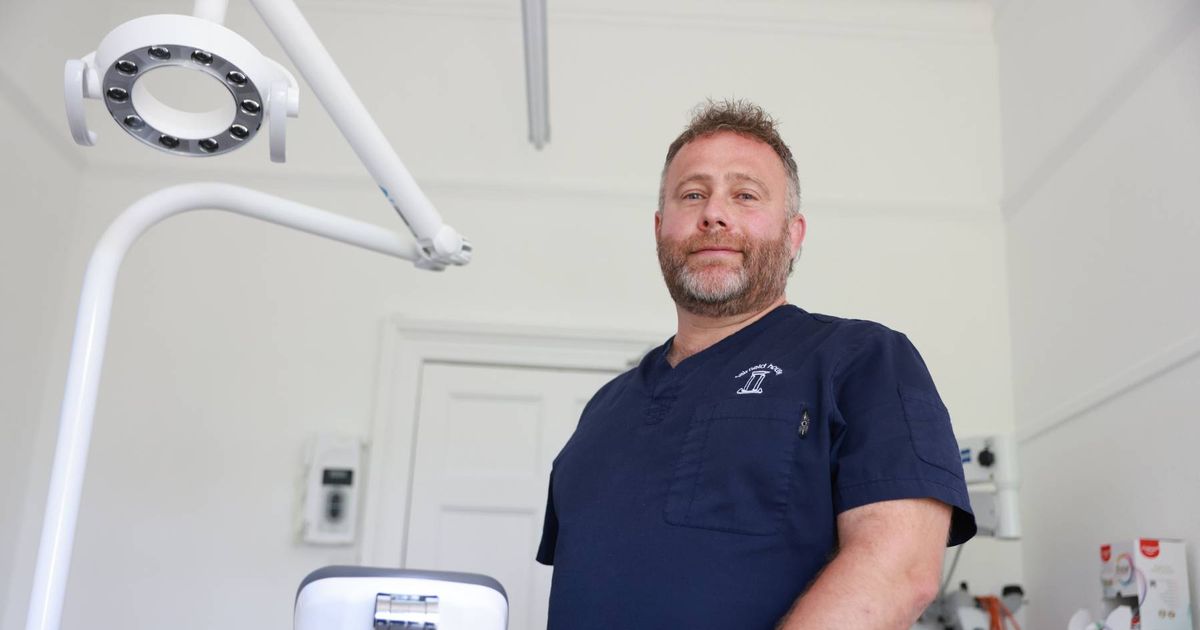The Mirror joined NHS dentist Rob Mew as he opened his books to new child patients every Thursday and the cases he revealed were heartbreaking
Martin Bagot-COV, Katy Hallam and Martin Bagot
05:19, 07 Jul 2025

Dentist Rob Mew(Image: Ian Vogler / Daily Mirror)
The UK is grappling with a largely unnoticed oral health crisis, as children who have never visited a dentist are requiring multiple extractions during their initial appointments.
NHS dentist Rob Mew has shared the distressing experiences he’s faced since dedicating Thursdays to accepting new child patients.
Our sister paper The Mirror travelled to Devon, identified as one of the nation’s most severe ‘dentistry deserts’, to launch a series of investigative pieces for its Dentists for All campaign.
Read more Expert names 6 foods that act like ‘weight loss jabs’ that are easy to add to diet
They visited Fairfield House Dental Surgery in Exmouth, which remains one of the few practices in Devon still catering to NHS clients.
Rob, the owner, is a staunch advocate for the NHS and its core tenet of providing care from “cradle to grave”.
Yet, this commitment to public service is the sole reason his clinic continues to see NHS patients, despite the potential to make hundreds of thousands more by switching to private practice.
Rob is currently facing a £150,000 penalty from the NHS due to a funding “claw back”, essentially for maintaining his patients’ dental health through regular check-ups and preventative measures.
This punitive measure is symptomatic of the highly criticised NHS dental payment contract that is driving dentists away from the public sector towards exclusively private clientele, reports the Mirror.
Every Thursday, Rob’s practice opens its doors to local children who haven’t had a dental visit in years, and for some, it’s their very first encounter with a dentist.
Rob, a father of three children aged ten, eight and four, shared: “That’s one of the reasons I do it because I have young children but it’s quite emotional.
“We were seeing four and five year olds who had so much decay we just had to send them to hospital to get extractions.
“There’s such a backlog of sending these kids to have general anaesthetic to get the teeth out so we’re trying to maintain them until they get their teeth extracted.”
He added: “One of the dentists saw a seventeen year old who hadn’t seen a dentist in ten years and needed 28 fillings.
“You’ve got really emotional parents that are feeling really guilty that they have got themselves into this position.
“One of our nurses said she couldn’t work on that list because it was too upsetting because she has kids of a similar age. It’s a really sad situation.”
Fairfield House Dental Surgery, with a history spanning over a century, has seen Rob become a partner in 2012 and later the owner in 2017 following another partner’s retirement.
The practice is actively involved in the community, offering free supervised tooth brushing at local primary schools and providing education to parents at breastfeeding and toddler groups.
Rob, 43, shared his dedication to his patients: “We’re blessed with a group of patients who’ve been with us for a long time, some have been coming here for more than 50 years.
“So that’s why I’m still with the NHS because it feels like the right thing to do, to keep going for them.
“It’s a kind of cradle to grave service which is what the NHS was supposed to be. But that’s the only reason we’re doing it – out of good will.”
Why is a top dentist being ‘fined’ £150,000 for keeping his patients’ teeth too healthy?
Rob Mew is at the helm of Fairfield House Dental Surgery, a beacon of NHS dentistry in an area otherwise parched of dental services.
The practice, which boasts ten dentists, also engages in complimentary community outreach to bolster oral health.
Yet during our visit, the surgery was in the midst of refunding £150,000 to the NHS due to not meeting the required number of Units of Dental Activity (UDA).
This has resulted in the practice shelling out £50,000 a month over a three-month period.
UDAs serve as the NHS’s yardstick within its dentistry payment contract, which has been labelled “not fit for purpose” by the Health and Social Care Committee of Parliament.
Under this contract, dental practices must commit to a certain quota of UDAs, facing penalties if they fall short or exceed the target.
A routine check-up equates to one UDA, while a filling procedure accumulates three UDAs.
Rob spoke to the Mirror, expressing his frustration: “We are being penalised for preventing patients requiring more UDAs.
“We have £150,000 ‘claw back’ this year but we have 19,000 NHS patients which is more than the practice has ever had.
“The clawback is for not doing enough UDAs but when patients are being looked after better they don’t have as much need for dental work.”
At Fairfield surgery, patients receive an annual check-up, unlike other practices that might only see lower-risk patients every two years.
Rob explained: “We are seeing them yearly and that’s one UDA. We are preventing loss of tooth.
“A GP practice is paid for how many patients they have on their list. That’s how they should be funding dentistry.”
Rob reveals that between five and ten individuals ring up daily, desperate for an NHS dentist appointment. Despite taking on as many as possible, he’s now had to start a waiting list.
He shared: “We have got patients travelling to be seen here from as far away as north Wales, Manchester and Sheffield.”
He highlighted a systemic issue with NHS dental care funding: “The NHS dental contract in England only funds enough for half the population to be treated so these patients have moved away but can’t get a dentist.
“And the Exmouth population is exploding and we have a load of new housing but no more dentistry money to treat the people in those houses.”
The Mirror’s campaign continues to press for the urgent reform of the detested NHS payment contract, which deters dentists from tending to those most in need.
Under the current system, dentists receive the same fee whether they do three fillings or 20, resulting in practices incurring losses when treating NHS patients.
Just last week, the Government laid out its Ten Year Health Plan with a vow that “by 2035 the NHS dental system will be transformed”, however, the British Dental Association is adamant that changes to the contract are imperative and must happen sooner.
Rob articulated the difficulty: “With these most vulnerable patients with high needs it’s really tricky for the practice to to make that work [financially].”
He recounted an episode involving a struggling family: “We had a family last Thursday with three kids and they had never been seen by a dentist.
“There was decay everywhere and they clearly need a lot of work and the parents are saying we haven’t been able to be seen anywhere.
“And they’re just tired because they’ve been calling around practices trying to get in and it kind of gets put on the back burner.”
A troubling case also emerged recently: “We had a 14 year old girl come in a couple of weeks ago and she had four crowns put on her back teeth.
“And you’re thinking, if we hadn’t handled that soon she would have a couple of back teeth missing and then a lower denture.”
Dental surgeries, including Fairfield House Dental Surgery, grapple with hefty running costs for staff and materials. The surgery is presently scrabbling together finances for a new dentist chair, which comes with a steep £30,000 price tag.
Rob, with an impressive 28-year tenure at the NHS that started when he was just a teenager in a hospital kitchen, spoke fondly of his commitment: “I’ve got a lot of good will towards the NHS so yeh I try my best to make it work.”
However, the future of NHS dentistry cannot hinge on good will alone.
The British Dental Association has sounded the alarm to the Public Accounts Committee, stressing earlier this year that the Treasury is banking on dental practices to provide care below cost – sparking a trend of NHS dentists switching to more profitable private practice.
The association reckons an average dental practice faces a loss of over £40 for every set of NHS dentures and £7 per new patient consultation.
Moreover, a biting critique from the Health Select Committee via a Parliamentary report has slammed the state of NHS dentistry as “unacceptable in the 21st century”.
Under the current NHS contract, dentists are finding themselves limited by fixed quotas on the number of NHS patients they can cater to annually because it places a ceiling on the number of treatments they can conduct.
Compounding the woes is over a decade of Tory-imposed real-terms budget cuts, which has left the £3 billion dedicated to England’s dental services falling short of providing for more than half of the population.
South West England emerges as the region where snagging an NHS dental appointment proves most difficult, as gleaned from last year’s GP Patient Survey data which involved a sizeable pool of 700,000 respondents.
It seems particularly bleak in Devon, suggested by the feedback from those who have tried to access NHS dental services within the past two years, hinting it could be one of the UK’s worst areas for securing a dentist.
Survey responses from various regional Integrated Care Boards (ICBs), which encompass NHS institutions, local authorities, and voluntary entities, revealed insights about dental care access.
One Devon ICB, accountable for healthcare services in the county, managed only a 72% success rate for existing NHS dentistry patients to book an appointment.
The figure surpasses the South West’s average of 74% but falls short of England’s overall rate at 84%.
For those in Devon trying to secure an appointment with a new dental practice, just 14% succeeded, against the South West’s 19% and the national average of 33%.
However, there’s a significant possibility that many individuals didn’t even attempt to get an appointment, believing it a futile effort.
The statistics paint a clear picture: only a scant number of dentists are taking on new adult clients, especially in areas like Devon and the rest of the South West.
Eddie Crouch, chair of the British Dental Association, commented: “This shows why the government is right to commit to major surgery for NHS dentistry, rather than mere sticking plasters. But we need pace.
“This service is on the critical list, and demoralised dentists are walking away every day this contract remains in force. If we don’t make a break in this Parliament there may not be a service left to save.”
Responding to these findings, a Department of Health and Social Care spokeswoman stated: “This government inherited a broken NHS dental system but we are getting on with fixing it through our 10 Year Health Plan.
“We have already begun the rollout of 700,000 extra urgent dental appointments, a ‘golden hello’ scheme is underway to recruit dentists to areas with the most need and we are reforming the NHS dental contract, with a shift to focus on prevention and the retention of NHS dentists – including introducing tie-ins for those trained in the NHS.”
